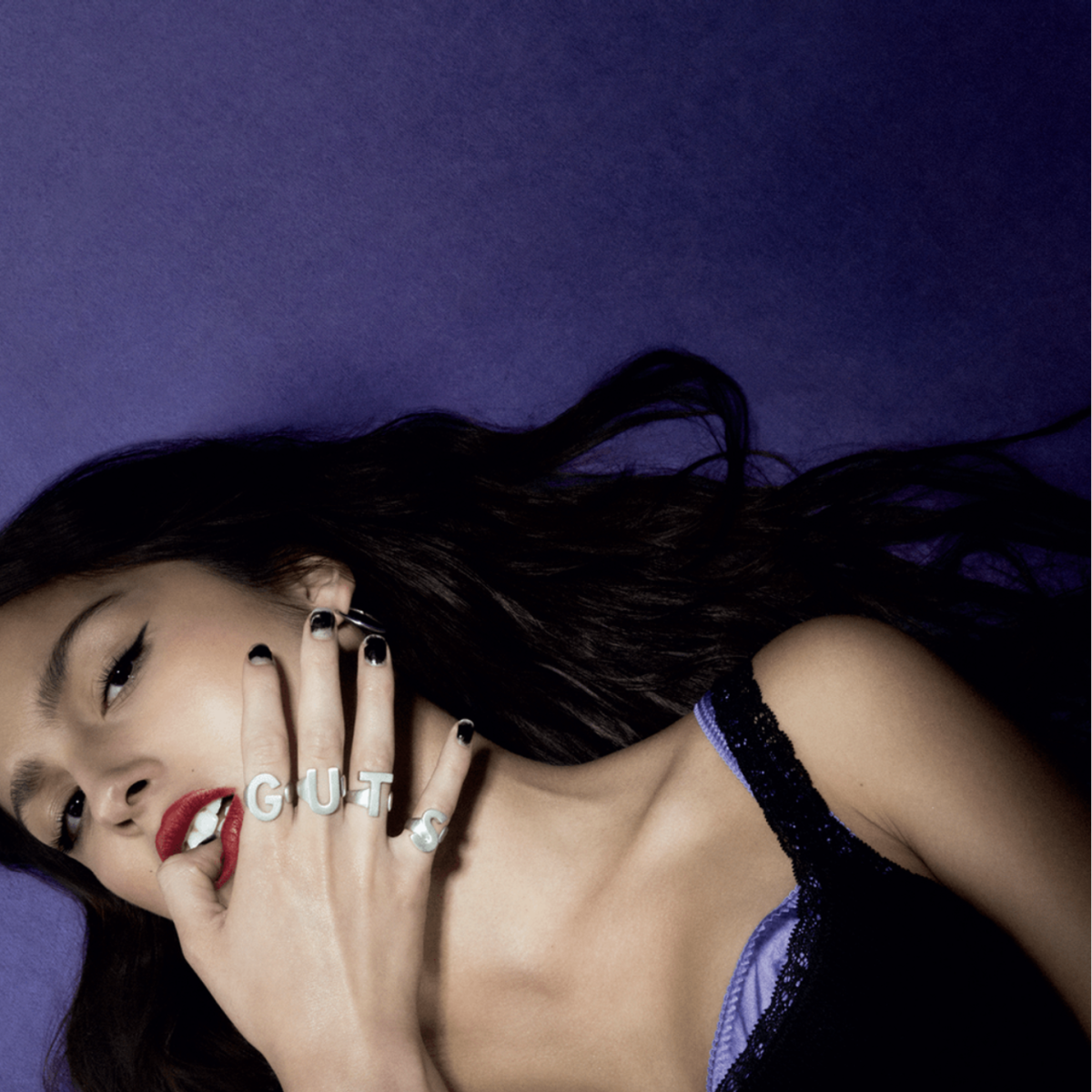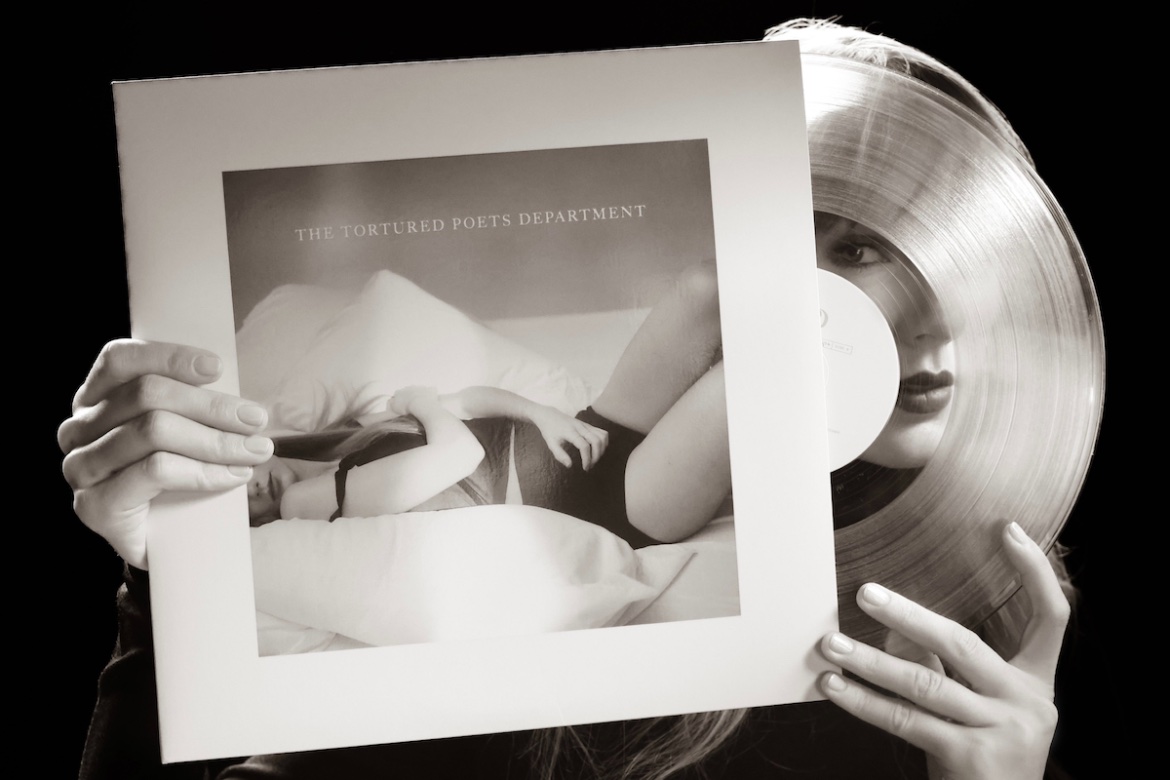Lately, I’ve been feeling like an “all-american bitch,” and I would argue that most women would agree with me. To be “light as a feather, stiff as a board,” to be “built like a mother and a total machine,” and most importantly, to be “grateful all the time” — these are the expectations of American women. And here is 20-year-old Olivia Rodrigo, belting them out on the first song of her sophomore album, GUTS.
During the opening track — arguably the best on the album — Rodrigo has found her voice. She begins the song in a soft way, her tone sincere. It is only with her lyric, “I’ve got sun in my motherfuckin’ pocket, best believe,” at the end of the first verse that she starts to hint at the underlying anger she soon releases in the chorus. From then on, the song becomes an anthem, her singing becoming sharper and the instrumentals sounding edgier. It isn’t until the end that she regains her softness, calming down her fury. This is when she asserts that she is “grateful all the time,” composing herself in a way women are all too familiar with. The journey of “all-american bitch” reminded me of America Ferrera’s monologue in Barbie — both women are making points that barely scratch at the surface of feminism, yet need to be said. In other words, I don’t think Rodrigo is saying anything groundbreaking, but her vocal critique of how society treats female celebrities and women in general is highly necessary. Not to mention, the song is a bop.
I loved Rodrigo’s previous album SOUR. Pop is not necessarily my go-to music genre, but Rodrigo just did everything right in her debut album. It was cohesive, honest, and featured her stellar vocals — how she hits those high notes in “drivers license” is beyond me. That said, the songs that intrigued me most on SOUR were those that were a bit punchier than the rest, particularly “brutal,” “good 4 u,” and “jealousy, jealousy.” These songs stood out from the rest for their brutal — pun intended — honesty about who she is and how she perceives the world. It is this style — the gritty, incisive power-pop — that I’m so glad she carried forward into GUTS. Alongside the opener, “bad idea right?”, “ballad of a homeschooled girl,” and “get him back!” all struck me as a continuation of what she’d hinted at in SOUR: she has more to her than somber heartbreak ballads. This is where Rodrigo shines.
Sometimes her lack of longevity in the music industry is obvious. I wasn’t impressed with the central metaphor in “making the bed” and the lyric “skin like puff pastry” in “lacy” irked me to no end. Maybe I’m just a snob who has worked in a pastry shop before, but I simply can’t picture skin being like puff pastry. Those two songs got stuck in my head — not in the fun, upbeat way the others did, but in how many times she repeated the title during the song. On the other hand, Rodrigo demonstrates that she does know how to produce compelling lyrics in songs like “vampire,” with its fast paced rhymes and imagery, or “the grudge,” with its show-stopping line “your flowers filled with vitriol.”
Despite my critique of certain songs, Rodrigo has done what I believe all good writing should do: she has taken the individual and made it universal. When SOUR came out, the story of her heartbreak with Joshua Bassett was horrifically publicized; there is no denying that her privacy was shattered. She made the best possible thing she could out of that situation with SOUR, and has subsequently elaborated on it with GUTS. She has a remarkable ability to make girls her age feel heard.
The final song of the album, “teenage dream,” is an apologetic, gut-wrenching song about failing to live up to expectations. Rodrigo is speaking from the perspective of a pop-star, yet simultaneously as a teenager/young adult. She vocalizes what was certainly my long-time fear, and what I imagine plagues teens in general: “They all say that it gets better / It gets better the more you grow / Yeah, they all say that it gets better / It gets better, but what if I don’t?” She repeats these lines four times in the outro of the song, allowing them time to really sink in. Here, she doesn’t sugarcoat, she doesn’t pretend to be cheerful and optimistic. She is honest, and in that, she is defining herself.











